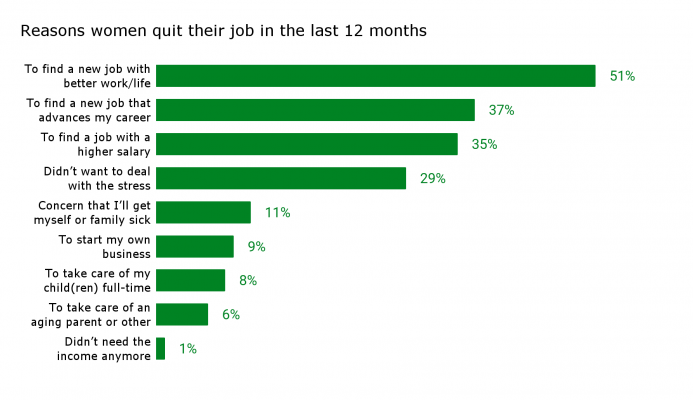Key findings:
- Women who quit their jobs in the last year were more likely to be looking for better work/life balance than a higher salary
- Women are still feeling burned out from work: 54% of women experienced burnout because of their job, roughly unchanged from last year
- Ambition rebounds from last year, and remains highest for women of color
- Young women and women of color are the groups who are most likely to report career advancements
- Mothers with children under age 18 are more likely than women without children to have faced a career setback in the past year
Women who found new jobs were looking for work-life balance more than money
About 1 in 10 (11%) women say they’ve quit their jobs in the last 12 months. Two in 10 (23%) have considered quitting, but the majority (64%) haven’t left or considered quitting their jobs.
Women who quit were likely to see better outcomes compared to those who considered quitting.
- Women who quit are far less likely to experience burnout compared with those who considered quitting (55% vs 82%)
- Women who quit felt more satisfied with the amount of career growth available at their current job vs. those who considered quitting (75% vs. 49%)
Not all quitters were leaving for a salary boost: 32% of women who quit say their salary is lower now than it was a year ago, which is higher than both women who considered quitting (24%) and women who didn’t quit or consider quitting (13%).

Many women still struggle with burnout
Over half of women say their mental health suffers to the point of burnout because of their job, all or some of the time (54%), roughly unchanged from last year (53%).
A quarter (24%) of women are working more hours now compared to a year ago, up from 19% a year ago. Just under half (46%) are working about as many hours as before, roughly on par with last year (47%). Just 20% report working fewer hours now, down from 24% last year.
Ambition begins to rebound, remains highest for women of color
Ambition, especially among women of color, rebounds from last year, but is still below early pandemic levels. Two-thirds (66%) of Black women describe themselves as “very ambitious” when it comes to their career, up from 54% in last year’s poll. Overall, about (49%) of women describe themselves as “very ambitious” when it comes to their career, up from 42% last year.

As seen in previous years, women of color remain ahead on ambition. Almost all Black women (93%), Hispanic women (90%), white women (86%), and Asian women (83%) describe themselves as very or somewhat ambitious.
Young women and women of color more likely to report career advancements
One in 5 women (20%) say their career has advanced in the last year, up slightly from March 2021 (14%). While 20% say their career experienced a setback in the last year, most (51%) say things have stayed the same.
- For women of color, ambition pays off: 28% of Hispanic women, 28% of Asian women, and 26% of Black women say their career advanced in the last year vs. 16% of white women and 15% of women of other races
- 1 in 3 young women have advanced in their career: 32% of women 18-34 say their career has advanced in the last year vs. 19% of those 35-64 and just 7% of those 65+
Women of color, mothers concerned that taking advantage of flexible work arrangements may impede career goals
Four in 10 (43%) women are concerned that taking advantage of flexible work arrangements at their jobs may prevent them from achieving career goals, up from 39% last year, but still just under the 45% benchmark from our 2020 International Women’s Day Poll (45%).
- Just 36% of white women have concerns over flexible work arrangements vs. 56% of Asian women, 53% of Hispanic, 51% of Black women and 49% of women of other races
- 52% of mothers with children under 18 years have concerns over flexible work arrangements (42% of women with no children, 37% of women with children age 18+)
- Mothers with children under 18 have more concerns over flexible work arrangements than fathers with children under 18 (52% vs 44%).
Men are more likely to describe the workplace as representative and diverse
Men are more likely than women to say their organization’s leadership is representative in terms of gender.
- 66% say men and women are equally represented among senior leaders in their organization compared with 58% of women
- 24% of women say men are over-represented among senior leaders compared with 21% of men
- 14% of women say women are over-represented among senior leaders compared with just 8% of men who say the same
Men are also more likely than women to say their organization is more diverse than it was three years ago (37% vs. 29%). The majority of adults overall (52%) say their organization is about as diverse as it was three years ago.
Read more about our polling methodology here.
Click through all the results in the interactive toplines below:



